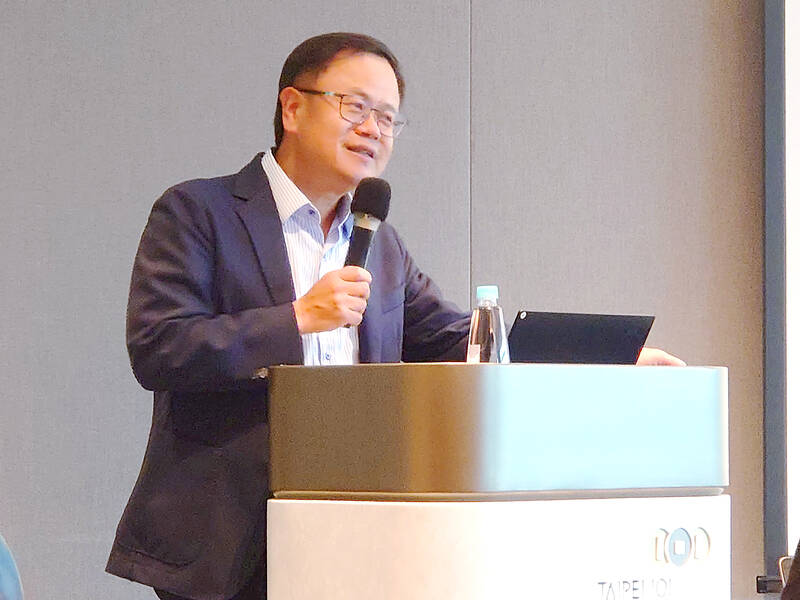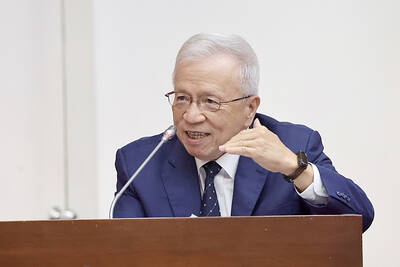Hon Precision Industry Inc (鴻勁精密), a supplier of chip test handlers used in advanced chip-on-wafer-on-substrate (CoWoS) packaging equipment, yesterday said it plans to expand production capacity by about 40 percent to meet surging demand from artificial intelligence (AI) and high-performance computing chipmakers.
The company counts Taiwan Semiconductor Manufacturing Co (台積電), US chip giant Nvidia Corp, and ASE Technology Holding Co (日月光投控) — the world’s largest chip packager and tester — among its major clients.
Hon also supplies active thermal control (ATC) equipment and cold plates that are used in advanced chip testing equipment.

Photo: CNA
The company plans to break ground on a new factory in Taiwan this quarter. Once operations begin in 2028, the facility is expected to raise the firm’s quarterly shipments to 750 units, up from the current 550 units, the company said.
“We have been doing our best to increase capacity, but customers’ demand still outpaces our capacity,” Hon Precision vice president Collin Weng (翁德奎) said at a media briefing in Taipei.
“The visibility for the first half of next year is also very clear. We do not see any shift at all,” he said.
The company’s production capacity is fully booked for the next two quarters, which is rarely seen for the semiconductor industry, where visibility typically extends only about three months, Weng said.
Equipment delivery lead times have stretched to four to five months, compared with the usual three to four months, he said.
Hon’s upbeat outlook echoed TSMC’s recent comments on sustained AI chip demand, which have eased market concerns over a potential “AI bubble.”
TSMC said earlier this month that it is also expanding its CoWoS capacity to close the widening supply-demand gap.
Hon expects a significant revenue growth next year, driven by strong customer demand, Weng said.
Key customers are upgrading test handlers and ATC equipment with higher price tags after new-generation chips enter production, using more complex technologies generating more heat, he said.
Revenue in the first nine months of this year more than doubled to NT$21 billion (US$683.6 million) from NT$9.03 billion a year earlier, the company said.
The US market contributed about 52 percent of its total revenue in the first half of this year, it said.
Net profit for the first half surged to NT$5.03 billion from NT$2.14 billion a year earlier, while earnings per share rose to NT$31.15 from NT$13.38, company data showed.
Shares rallied 8.07 percent to NT$2,235 on the Taipei Exchange’s Emerging Stock Board yesterday, making it the most expensive stock on the preparatory board. The company plans to debut its shares on the Taiwan Stock Exchange next month.

JITTERS: Nexperia has a 20 percent market share for chips powering simpler features such as window controls, and changing supply chains could take years European carmakers are looking into ways to scratch components made with parts from China, spooked by deepening geopolitical spats playing out through chipmaker Nexperia BV and Beijing’s export controls on rare earths. To protect operations from trade ructions, several automakers are pushing major suppliers to find permanent alternatives to Chinese semiconductors, people familiar with the matter said. The industry is considering broader changes to its supply chain to adapt to shifting geopolitics, Europe’s main suppliers lobby CLEPA head Matthias Zink said. “We had some indications already — questions like: ‘How can you supply me without this dependency on China?’” Zink, who also

At least US$50 million for the freedom of an Emirati sheikh: That is the king’s ransom paid two weeks ago to militants linked to al-Qaeda who are pushing to topple the Malian government and impose Islamic law. Alongside a crippling fuel blockade, the Group for the Support of Islam and Muslims (JNIM) has made kidnapping wealthy foreigners for a ransom a pillar of its strategy of “economic jihad.” Its goal: Oust the junta, which has struggled to contain Mali’s decade-long insurgency since taking power following back-to-back coups in 2020 and 2021, by scaring away investors and paralyzing the west African country’s economy.

BUST FEARS: While a KMT legislator asked if an AI bubble could affect Taiwan, the DGBAS minister said the sector appears on track to continue growing The local property market has cooled down moderately following a series of credit control measures designed to contain speculation, the central bank said yesterday, while remaining tight-lipped about potential rule relaxations. Lawmakers in a meeting of the legislature’s Finance Committee voiced concerns to central bank officials that the credit control measures have adversely affected the government’s tax income and small and medium-sized property developers, with limited positive effects. Housing prices have been climbing since 2016, even when the central bank imposed its first set of control measures in 2020, Chinese Nationalist Party (KMT) Legislator Lo Ting-wei (羅廷瑋) said. “Since the second half of

AI BOOST: Next year, the cloud and networking product business is expected to remain a key revenue pillar for the company, Hon Hai chairman Young Liu said Manufacturing giant Hon Hai Precision Industry Co (鴻海精密) yesterday posted its best third-quarter profit in the company’s history, backed by strong demand for artificial intelligence (AI) servers. Net profit expanded 17 percent annually to NT$57.67 billion (US$1.86 billion) from NT$44.36 billion, the company said. On a quarterly basis, net profit soared 30 percent from NT$44.36 billion, it said. Hon Hai, which is Apple Inc’s primary iPhone assembler and makes servers powered by Nvidia Corp’s AI accelerators, said earnings per share expanded to NT$4.15 from NT$3.55 a year earlier and NT$3.19 in the second quarter. Gross margin improved to 6.35 percent,